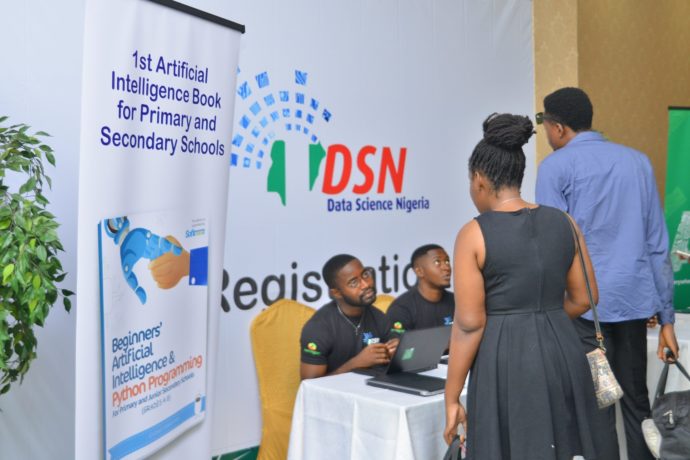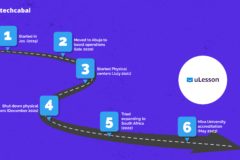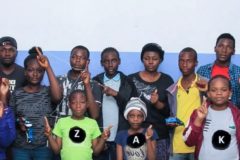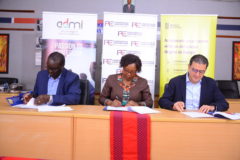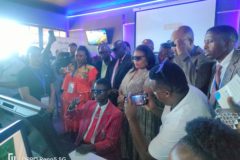At a packed hall in Lagos, a gathering of education and technology enthusiasts cheered for a milestone moment: the launch of Nigeria’s first book on artificial intelligence for primary and secondary schools.
The eight-chapter book illustrated with animations is written by Olubayo Adekanmbi, convener of Data Science Nigeria (DSN). His organisation has taken an active role in democratizing artificial intelligence application and research in Nigeria. With a suite of hands-on training programmes, toolkits and events, Data Science Nigeria aims to increase Nigeria’s presence on the global AI map.
“AI is a catalyst for good that creates new frontiers,” Adekanmbi said, in his remarks at the launch. “It brings significant impact on national competitiveness.”
Founded in 2016, DSN has set its sights on training one million AI talents in ten years. About 25 million pupils enrol in primary schools annually in Nigeria, with about 6 million students enrolling in junior secondary schools. Population growth trends in Africa create the urgency for today’s young people to be adequately equipped for an uncertain future of work and life. With the world’s leading companies focusing on developing AI-driven innovations, it becomes imperative for Nigeria’s educational system to prepare her children using curriculum and content adapted for the near future.
“This will serve as the beginning to say we can create platforms, content and programmes that can reach a wider market,” says Joseph Agunbiade, founder of Univelcity, an online platform for coding lessons, to TechCabal. “The future of the whole tech conversation is the people in secondary schools. [This book launch] is an eye-opener telling us that we need to find ways to reach these students.”
Data Science Nigeria collaborated with Softcom, a technology solutions company, to provide copies to students for free. Through a train-the-trainer programme, DSN plans to host computer science and mathematics teachers from public and private schools on a one-day familiarization class. The teachers will be introduced to the book’s content and engaged with some coding instructions. A workbook, to be produced at a later date, will be made available to the teachers to help them guide students better and assess comprehension.
For anyone thinking it is too early to introduce Nigerian children to AI, students invited to the launch made the opposite case. In brief presentations to the audience on AI-related topics, they showed why the conversation on AI education applies as much to current realities – revamping the economy, job creation, self-driving cars – as to the next decade.
Patrick Dinneya, a teacher at Julliard Academy – winners of the short presentation session – was grateful for the focus on students in primary and secondary schools.
“Children at that level want to explore and know more,” Dinneya said to TechCabal. “They can easily understand [this book] because I’m sure it is written in the language that suits them. When they read it, they can begin to understand the world we live in – because it is not really about the future, AI is about the world we are living in – and it sets them on course for their own future.”
Today, practical AI applications can be found in every facet of life. In his presentation at the launch, Thomas Dietterich, a machine learning pioneer and emeritus professor of computer science at Oregon State University, called attention to the enterprise potential of using AI to make sense of weather data.
Drawing on his work with the Trans-African HydroMeteorological Observatory (TAHMO), he challenged innovators to think up startups that could use weather data for disease prediction, transportation and logistics, and crop insurance.
A similarly strong case was made by Stephen Odiabo, CEO of Retina AI, whose team created the world’s first AI app for eye-care providers. Lawrence Muthoga, Microsoft’s developer audience lead in Africa, captured the audience’s imagination with Seeing AI, Microsoft’s specialized AI-driven personal visual aid system. There were words of caution from Kathleen Siminyu – network coordinator Artificial Intelligence for Development Africa (AI4D Africa) – on ensuring AI systems are inclusive of all people without discrimination.
It’s one book but Beginners’ Artificial Intelligence & Python Programming sets a bar to be emulated, according to Emeka Azuka Okoye, a technologist and advocate of the primacy of education and research in achieving sustainable technology development in Nigeria.
“This is a very good step, something the Federal Ministry of Education should be doing,” Okoye said to TechCabal. “Bayo and his team are doing something that we should all be happy for. Indirectly, [Data Science Nigeria] has crafted a curriculum for our primary and secondary schools. This is the beginning but more needs to be done.”
Okoye wants the government to embrace and lead this initiative as there is only so much the private sector can do. The government’s role will not necessarily be driven by money but by creating the environment that empowers education authorities to innovate quickly. “We have to be intentional about what we want to do and what we expect to get out.”







